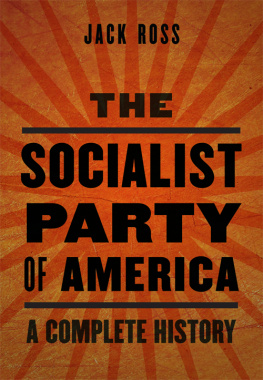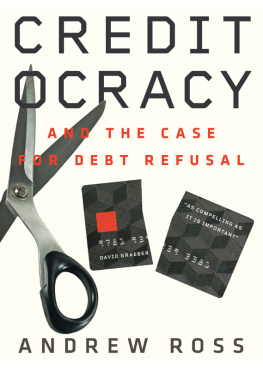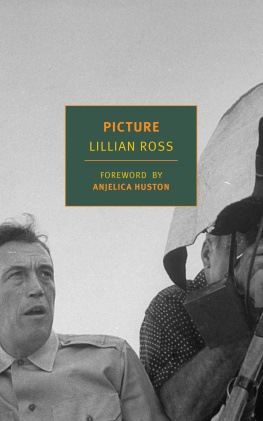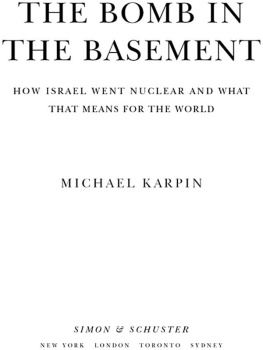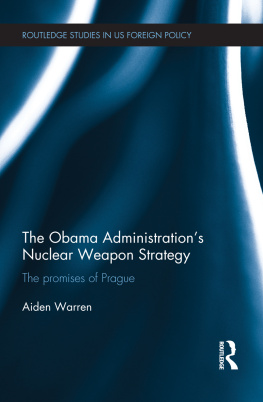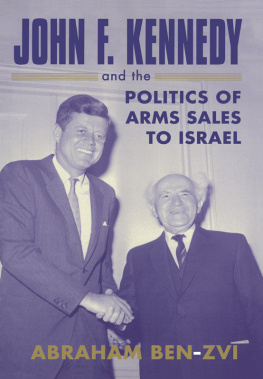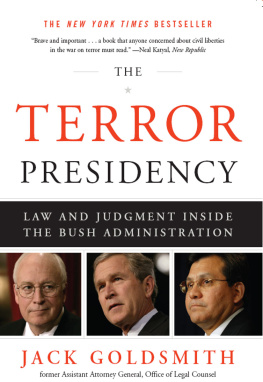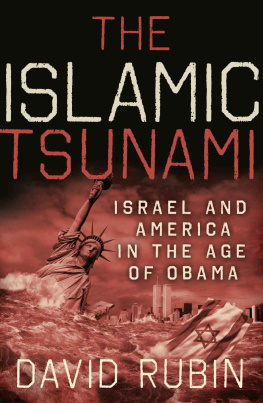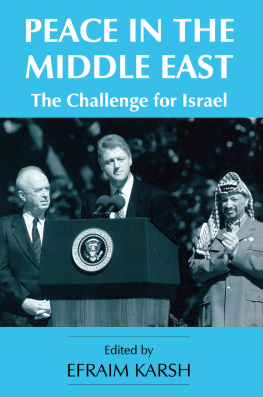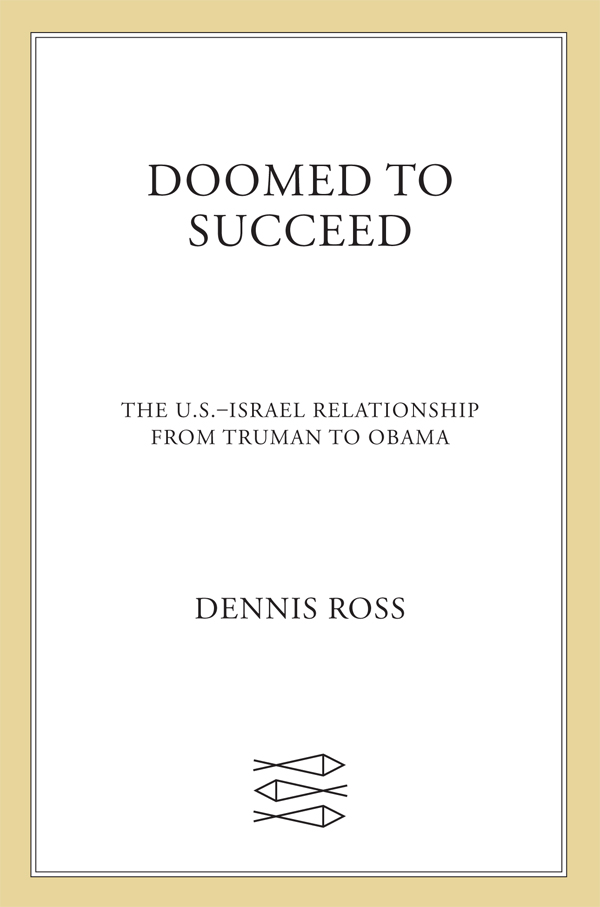Contents
Guide

The author and publisher have provided this e-book to you for your personal use only. You may not make this e-book publicly available in any way. Copyright infringement is against the law. If you believe the copy of this e-book you are reading infringes on the authors copyright, please notify the publisher at: us.macmillanusa.com/piracy.
To the memory of Fred Lafer, who was my friend, a mentor, and a role model
On March 28, 2011, President Obama was in the Situation Room for a secure video conference with David Cameron, Nicolas Sarkozy, and Angela Merkel. The president periodically held calls with his British, French, and German counterparts on a host of issues. Now, looking ahead to the G-8 summit, to be hosted by President Sarkozy in Deauville, France, they discussed the upheaval in the Arab world and how economic support from the G-8 countries, as well as from the larger circle of the G-20, could help the transformations in Egypt and Tunisia succeed.
As the special assistant to the president on the National Security Council staff responsible for an area that ran from Morocco to India, I was there to provide any support the president needed on this issue, as well as on Libya. Notwithstanding Merkels presence (Germany had decided not to provide direct military support to the campaign in Libya), Cameron and Sarkozy were bound to raise it. Their ambition to defeat Muammar Qaddafis forces exceeded their means to sustain air-to-ground missions at the level of intensity needed. Though Cameron and Sarkozy had accepted the presidents ground rules for launching the campaignthat the United States would use its unique military assets initially, and for a finite period, to shape an environment in which it would be safe for the British, French, and others to carry out the mission of protecting Libyan civiliansthey were now eager for the president to extend the time our forces would assume the lions share of the burden.
The discussion, however, took an unexpected turn. After discussing Libya, plans for the upcoming G-8 summit, and the multinational means that could be mobilized to support Egypt, the three European leaders shifted their focus, launching into a diatribe against Benjamin Bibi Netanyahu, Israels prime minister. There was a venom seldom heard when leaders talk about other leaders. They took turns excoriating him, describing him as unreliable and a liar, who rendered peacemaking impossible and whose unwillingness to take the necessary steps for peace would help to radicalize the Arab Springand thereby threaten all of our interests in the region. They even accused President Obama of enabling Netanyahus obstinacy.
But what was driving the popular uprisings in the Arab world was the profound sense of injustice in the different countries, and not the Palestinian issue, as important as it was. This awakening among Arab publics was about their self-determination and their future, not the destiny of the Palestinians. Yet you would not have known that from these leaders preoccupation with Netanyahu and the consequences of the stalemate on Israeli-Palestinian peace. They did not evidence the slightest recognition that Israel might have needs or that Abu Mazen (Mahmoud Abbas), the Palestinian leader, might bear some of the blame for the absence of movement on peace. The president sought to redirect the discussion and to explain to his European counterparts some of these realities and Netanyahus predicament. These three leaders were having none of it. They made it clear that if Obama did not present American principles on peace to force Netanyahus hand, they would do so.
At one level, I was not surprised. Much of my time, and that of other senior officials, was devoted to defending Israel from moves designed to single it out for extensive international criticism. Whether it was trying to head off a move at the Human Rights Council, or a critical political statement from the European Union, or a possible UN resolution condemning Israel, it seemed that this Israeli government was a lightning rodand in constant need of our help. Like it or not, many of our allies were fixated on Israels alleged responsibility for the enduring conflict with the Palestinians and how this affected our collective position in the Middle East.
Still, I was struck not only by the vitriol but also by who was conveying it. These leaders prided themselves on being friends of Israel. Sarkozy and Merkel were publicly outspoken in this regard. Sarkozy had consciously dissociated himself from his predecessor, Jacques Chirac, and his demonstrably pro-Arab legacy. And yet here they were seemingly holding Netanyahu solely responsible for the breakdown in the peace process and for what they perceived to be the dire ramifications for the region of the unresolved conflict.
I wondered if this was about Netanyahu or if there was something deeper going on. Were attitudes changing toward Israel, with Netanyahu serving as a convenient pretext? I could also not help thinking about the irony of President Obamawho had been consistently vilified in parts of the American Jewish community for being too critical of Israelbeing cast in the role of Israels defender before our closest allies.
I remained in the Obama administration until the end of 2011. During that time I witnessedand was often in the middle ofthe constant pull and push in our relationship with Israel. There were moments of tensioneven angerbetween the leaders. Yet the areas of cooperation continued to deepen. Moreover, our support for Israel, even in tough budgetary times, was expanded. True, there was a congressional push for increased support, but it was rarely a case of having to impose it on a reluctant administration.
After leaving the administration, I continued to travel frequently to Israel, meeting both with those in and outside the government, including the prime minister. I saw the rising concern about the delegitimization movement internationally, a movement fed by the Palestinian belief that this was Israels vulnerability and therefore its own point of leverage. The United States remained the main bulwark against this movement, and although I understood that Israel needed to do much to help itself, I wondered whether we would continue to make the effort to stand with Israel. President Obama often said in my presence that whoever was in the Oval Office would support Israel, but that our influence on others would diminish. He pointed to votes in the UN General Assembly where, along with Micronesia and maybe Canada, the United States and Israel often stood alone.
Was Obama right that we would continue to back Israel regardless of who occupied the Oval Office? I knew that a constituency within his administration was not enthusiastic about doing so. But I also knew that every administration I had served in, starting with the Carter administration, had such a constituency. Indeed, in earlier times, it had been far stronger. With the current efforts to isolate Israel internationally seeming to have more impact with our key European allies, could this constituency emerge stronger and redirect our policy? Was the trajectory of our relationshipwhich seemed to move in the direction of ever closer collaboration even with presidents who did not have an instinctive attachment to Israelbound to continue?
The more I have thought about these questions, the more they seemed to require a deeper look, particularly at a time when the Middle East is experiencing such upheaval. I say this even though I recognize that it is not new for Israel to be singled out in the international arena. After all, the UN General Assembly adopted the grotesque Zionism is Racism resolution in 1975. Resolution 3379 embodied the effort to reject and delegitimize Israel, led by the Arabs but supported by the so-called Non-Aligned Movement and backed by the Soviet bloc in its competition with the West during the cold war. With the end of the cold war, that era of ostracism and rejection of Israel seemed to be over. The resolution was rescinded. And, with the Madrid Conference in 1991, which brought Israel and its Arab neighbors to the same peace table, and the Oslo Accords in 1993 and 1995, which produced mutual recognition between Israel and the Palestine Liberation Organization, Israel could do business everywhere in the world.




